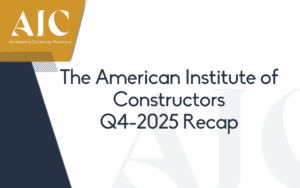As a construction management student, you’ve taken the first step into a dynamic and ever-evolving industry. The construction sector is one of the most vital components of the global economy, responsible for shaping the future by building the infrastructure that supports modern society.
However, entering this industry requires more than theoretical knowledge from textbooks and lectures. To truly excel and carve out a successful career, it is essential to understand the significance of training and development in construction industry careers.
The Benefits of Training and Development in the Construction Industry
Beyond learning technical skills, perfecting management styles, and creating a resume that will attract recruiters’ attention, students must understand how to combine what they learn in school with real-world experiences.
Passing a test in college is much different than making the right decision on a job site that will affect safety, budgets, and timelines. This is where training and development become crucial to respond effectively in all situations.
The American Institute of Constructors (AIC) knows that education is paramount in the construction field, and that’s why we consistently promote education and certification for everyone in the industry to help you transition from student to construction manager. Here are some practical tips to make the transition.
1. Bridge the Gap Between Theory and Practice
One of the primary benefits of training and development in the construction industry is the ability to close the gap between classroom learning and real-world application. While your academic studies provide a solid foundation of theoretical knowledge, the practical skills required on a construction site are often learned through hands-on experience.
Employee training programs, internships, on-the-job training, and apprenticeships offer invaluable opportunities to apply your knowledge in a controlled, supervised environment. Consider enrolling in a specialized program to enhance your skills.
2. Enhance Technical Skills
The construction industry is highly technical, requiring proficiency in various tools, machinery, and software. Training programs are designed to enhance your technical skills and ensure you are well-versed in the latest technologies and methodologies.
For instance, learning how to operate advanced construction equipment, understanding Building Information Modeling (BIM) software, and mastering project management tools are crucial skills that can be developed through targeted training.
3. Uphold Safety Standards
Safety is paramount in the construction industry. Given the inherent risks involved, it is crucial to be well-versed in safety protocols and regulations. Training programs like OSHA 10 and OSHA 30 focus extensively on safety, teaching students how to identify potential hazards, use protective equipment correctly, and respond effectively to emergencies.
By completing safety training, you can significantly reduce the likelihood of accidents and ensure a safer working environment for yourself and your colleagues.
4. Stay Updated with Industry Trends
The construction industry is constantly changing. New technologies, materials, and techniques are emerging regularly, so it’s essential to invest in continuous training and development to stay updated on the latest industry trends.
For example, sustainable construction practices – such as green building techniques and energy-efficient designs – are gaining prominence. By staying informed about these developments, you can position yourself as a forward-thinking professional who can contribute to innovative projects and align with owner requests.
5. Understand How to Respond to Ethical Situations
Ethics is the backbone of construction management. And, it’s easy to mentally commit to ethical dealings in the classroom, but what happens when you’re placed in a real-world situation where there is internal and external pressure to bend?
We recommend taking continuing education classes that deal specifically with ethics so that you can practice responding to common situations you may face. These classes will provide you with scenarios and guide you through the decision-making process, helping you develop critical thinking skills.
Remember, as a construction manager, it is your responsibility to uphold ethical practices and ensure that all parties involved are treated fairly. Don’t be afraid to seek guidance from mentors or colleagues when facing difficult decisions, such as AIC members who have faced the same issues you will face in your career.
Build Your Future with AIC: Benefits of Industry Involvement
At AIC, we promote continuing education throughout your career. Taking advantage of our resources will help you stay abreast of new developments that can help you continue to grow as a construction manager. Consider the advantages of becoming involved in AIC.
1. Boost Employability and Career Advancement
In a competitive job market, having a robust training and development background can make you more attractive to companies looking to hire. Employers in the construction industry highly value candidates who have undergone formal training and have practical experience.
Earning certifications such as the Certified Associate Constructor (CAC) Level I certification and/or Certified Professional Constructor (CPC) Level II certification through AIC can set you apart from other candidates and make you a more attractive prospect for potential employers.
The CAC certification, in particular, is tailored for students and early-career professionals, ensuring you have a solid foundation in construction management fundamentals. This certification helps students stand out in the job market by demonstrating competency and readiness to contribute to the industry.
Furthermore, professional development goes beyond entry-level positions. You will discover that continuous professional development is essential for advancement as you progress in your career.
By pursuing advanced training and certifications through AIC, you can qualify for higher-level positions, such as project manager, site supervisor, or construction manager, increasing your earning potential and job satisfaction.
2. Develop Soft Skills
While technical skills are crucial, the importance of soft skills should not be overlooked. Effective communication, teamwork, problem-solving, and leadership are all essential attributes for a successful career in the construction industry.
At AIC, we offer numerous opportunities to participate in various committees and join the Board of Directors. These opportunities will help you develop leadership skills that can help you improve interactions with colleagues, clients, and stakeholders in construction management.
For example, construction projects often involve collaboration with diverse teams, including architects, engineers, contractors, and clients. Developing strong communication skills at AIC will enable you to translate these skills to the job site, where you must be able to communicate ideas, resolve conflicts, and ensure that projects run smoothly.
3. Access Networking Opportunities
AIC offers excellent networking opportunities to grow your professional connections. Building a robust professional network can open doors to job opportunities, mentorship, and collaborations on future projects.
Becoming a member of AIC means joining a community of like-minded individuals who are dedicated to excellence in construction management. Our community offers support, educational resources, and opportunities for professional growth, helping you find trustworthy answers to crucial questions.
By participating in AIC, construction management students can stay up-to-date on industry trends, learn from experienced professionals, and network with peers and potential employers in preparation to enter the workforce.
4. Embrace Lifelong Learning
The concept of lifelong learning is particularly relevant in the construction industry. As the industry advances, so must your skills and knowledge. Embracing a mindset of continuous improvement and professional development ensures that you remain adaptable and resilient.
AIC offers webinars, continuing education courses through partnership programs, and other resources to help you stay informed and uphold your commitment to professionalism in this dynamic field.
Investing in training and development benefits you and contributes to the overall advancement of the construction industry. As you prepare to enter the workforce, remember that the knowledge and skills you acquire will be the foundation of future success.
AIC is Here to Support Your Professional Growth
AIC plays a significant role in promoting and supporting training and development for construction management students. We have created a robust program – from our comprehensive certification programs to educational resources to networking opportunities for AIC members – to ensure you are prepared to transition to construction management.
Want to learn more about our commitment to training and development in construction industry settings? Follow us on LinkedIn for up-to-date announcements and helpful info! Gain insights on the latest topics in construction management to stay informed.




